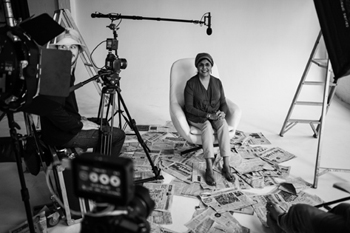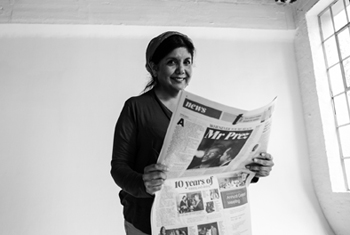

Zubeida Jaffer
Photos: Adrian Steirn, 21 Icons South Africa
|
The nation-building initiative known as 21 ICONS South Africa, was recently thrilled to announce that Zubeida Jaffer will feature in their second season due to her professional excellence as a journalist and author.
Jaffer is a well-known South African reporter and author and has been a writer-in-residence at the UFS for three years now. The 21 ICONS project was inspired by Nelson Mandela and has created a movement for positive change. By sharing the stories of iconic South African men and women, the intention is to inspire new generations to follow in their footsteps.
One icon is featured per week in a visual celebration of engaging and entertaining portraits and short films, along with an essay biography across multiple media platforms such as print, broadcast, outdoor and social media. Jaffer’s short film will be broadcasted on 2 November 2014 at 20:27 on SABC3 and her collectable portrait will be published in City Press on the same day.
Jaffer’s short film discusses her truth as a journalist and activist who was a key figure in the struggle movement in the Western Cape during apartheid. In an intimate conversation with Adrian Steirn (creator, photographer and director of 21 ICONS, Jaffer talks about her journey as a journalist who always seeks to uncover the truth and give people who don’t have a voice an outlet to express their views, opinions and thoughts.
Other iconic South Africans that have featured on 21 ICONS, were among others, Francois Pienaar (former Springbok rugby captain who won the 1995 Rugby World Cup), Pieter-Dirk Uys (satirist who used comedy and caricature to oppose the apartheid government) and Frene Ginwala (the first female speaker in the National Assembly of South Africa).
With the country celebrating 20 years of democracy, the message that everyone can do something to make a difference – which is portrayed in these powerful and inspiring stories that make up the second season of 21 ICONS – has been well-received by South Africans.
Be sure to get your City Press early and tune in on the evening of 2 November 2014 to see Jaffer’s feature on 21 ICONS.
Jaffer is also the publisher of the Journalist website (http://www.thejournalist.org.za/) launched earlier in 2014, of which the UFS is the founding member. The Journalist is “an independent, non-profit organisation working with the academic community and a range of credible online entities to make their knowledge more accessible to the wider public.”